Build Your Digital Library: Guide To Saving Life Changing Material
109: How to save valuable information in times of uncertainty.
Welcome reader! How would you feel if your favorite book completely disappeared? Do you remember that article that changed your life? Wondering why you can’t find it anymore? It might be because the webpage is no longer available, and no one else has a copy. It happened to us during the 2014 - 2018 (golden era of the internet), when we lost a good chunk of the content that helped us. Once that happens you realize how important it is to have your own digital library. Now the question is what would you do if you knew that nothing on the internet is permanent? We got you covered.
You, Your Favorite Articles And Your Digital Library Of Alexandria
Additional reading on the topic:
Life-changing: If you have done even a bit of reading, you know there are certain things you read that you can’t stop thinking about. We would go so far as to say that they stay with you for ages. How many times has that happened to you? If you are one of those who have experienced it… Consider yourself lucky. We definitely did. At the same time, considering the feedback we have been getting over the years. One good article, video, or course can alter the whole trajectory of your life. We are serious. How does one define life-changing? It has to 1) explain the basic idea, 2) what it means for you and what the consequences of the same are, and 3) practical steps to achieving the desired outcome. It doesn't mean the material is not good if it doesn’t follow that approach. Our material doesn't always follow that template. This is our observation after writing for years. Not to mention that this is becoming more important as AI-generated content is taking over the internet. What will give real creators an advantage? Showing others how to turn their ideas and concepts into actionable steps everyone can implement.
A few more on how to define life-changing material:
You can’t stop thinking about it.
You catch yourself having an inner "aha" moment about how real and obvious it has been all this time.
You saw instant results after putting it into action.
You notice more and more patterns mentioned - things are starting to click.
Looking for a solid example? $1 Million, 10 Years, Zero Excuses
Why do you want to start building your library? Before diving deeper into why you want to create your own digital Library of Alexandria. The basic approach involves saving everything that: 1) makes you think, 2) seems interesting, 3) comes from a trusted source, and 4) you believe you want to dive deeper. These are the basic criteria not only for saving. But also how you want to be diving deeper into the material you consume. Vouching is at least 50% of the game (at least). Once you are past knowing what material you want to consume and what gets you going. Next is realizing that nothing is permanent and that all life-changing (for you personally) information should be saved and preserved. Think about the knowledge lost with the Library of Alexandria, Maya manuscripts, or Chinese imperial libraries (Qin Dynasty). Since this is not a history class - we are leaving it up to you to decide whether you will dive deeper into it. Neither the idea here is to go schizo. But at the same time, there is a good chance that the books you are reading now might not be the same in 10 to 20 years. Ian Fleming, Mark Twain, Agatha Christie… Even if their work is available, it doesn’t guarantee it remains true to its original form. They already started to change parts of it to make them "more friendly". Look at what has happened over the last few years (click here, here, or here). This trend won’t change anytime soon.
What happens when everything needs to fit in or work with certain criteria? The original content changes. As a result, it has a direct impact on the history and future direction of things. It is all on a big cycle you should not participate in or better said protect yourself as much as possible. Knowing what is real and what is not. When we first started going online, there was an idea that every form of media would be saved and accessible to all.People thought that because they could rip DVDs and upload them online for others to download, they were safe. Wrong. That still is the case if you are referring to things that were popular 50 years ago. No one has trouble finding Led Zeppelin albums online or on Spotify.Should that surprise anyone? No. They were one of the most popular bands of the 20th century. It would be sad not to be able to find their work with just two clicks in this day and age. If we put aside the censorship issues and how winners are writing the history (better said modifying). The problems arise when material that was never meant for the masses (think specific books, niche videos, or even courses) gets lost. Part of the issue is the abundance of the material. The other part is that only a small number of people had original access to it. It gets much deeper, but there is no reason for us to dive into it. Since we are all operating within the attention economy, preserving old material will only become harder. The links will die, the new content becomes more relevant, and there will not be enough people caring about it in the first place. It is always a mix between those factors. What you need to understand is that the only guaranteed way to access something that has left an impact on you is to create it yourself.
Data hoarding: The purpose of this post is not to turn you into a data hoarder. No matter how closely related the post is to the data hoarding. Your goal should not be to collect useless information and save it because one day it won't be accessible. You want to save only things that impact your life and that you know you will find valuable. Data hoarding is pointless. Why? Ask yourself, what is the most limited resource? We all know it's either time or energy. Now ask yourself, do you think you will have hours to go through your entire backlog, or are you just doing it to feel better? To give yourself that false sense of knowing more than others or having information others don’t. It is one of those games you don’t want to participate in since it is a waste of time.
What post won’t be:
Schizo rant that they are rewriting history and manipulating people (they do - but we all know that history was written by the winners IYKYN)
Overall technical (you need to know some stuff to pull it off)
Data hoarding guide - waste of time
How to build your NAS/RAID or server setup to protect your data
EMP protection type of the post (prepper material)
Things You Want To Keep In Mind
Making it practical (Least Friction): How you should approach saving your data and building out the library comes down to minimizing friction. That is the key to doing it long-term. You want to do everything you can to ensure that a) your data is as safe as possible (minimize the risk), while also making it so that your data is accessible on multiple devices at the same time (making it practical). The first one ensures that you never have to worry about whether things go south, and the second one ensures that you are not dependent on just one device or location (where that device is). You want to build your digital library in a way that works for you. Safe, accessible from any location with any device. That is how you should approach it.
Annual Review: Since your collection will grow based on your interests, set aside a day or two each year to review everything you possess (this should be done annually). Your goal is to get rid of (delete) everything that you don’t use anymore. Basic example you tried to learn how to make SaaS, and you had materials saved in your library. After some time, you have decided that it is not for you and have given up on it. Meaning? There is no reason to keep that material. Delete it ASAP. The key difference between data hoarding and this approach is that hoarding keeps it, while our approach would delete it. This encourages you to eliminate unnecessary material and retain only the most relevant content. The practical aspect is that all your copies should look the same. Deleting the tech books since you don’t want to build software anymore? Apply the same principle across all your storage options. This ensures you are running well-optimized operations and have all the relevant information that you have pre-filtered.
Practical Steps To Building A Digital Library - System That Works For You
Your (physical) library: We have not mentioned it until now because it can be complicated. You will never be able to replace physical items with digital ones. No one can deny it. If you are in a position where you can build out your library (or office) within your apartment or a house… Do it. It is one of those things that you will never regret. Fill it with unique art, plants, or random artifacts. 100% that you will never regret doing so. On the other hand, when it comes to your library, books, and everything else. There are a few problems. Physical items take up a lot of space and can be a logistical nightmare. Our advice is to focus on building the physical part of your library only if you are not planning on moving or making big changes to your environment. It may sound limiting, but it is a necessary reality check.
The same applies if you are a young person who moves frequently. Meaning you won't even have time to spend in your space with the things you love. This doesn't mean you should avoid buying anything or collecting art altogether. But you should approach it in a way that avoids building a large collection. Those who had to go through this will know what we are talking about. Once you reach a certain point in your collection, you have to realize that most of those books, papers, and other items you won’t be able to move. Better said, you would if you were willing to pay a few dollars for one when it comes to transportation. We are leaving that part up to you. If you are not planning to move or change your location, then it's a good idea to build your library.
The levels and what they mean for you: To make things more interesting, we have decided to include levels and keep it as simple as possible to illustrate our point and position you accordingly. Where do you want to be? Level 2. Why? Because this will be more than enough for most people reading this. Plus, it will ensure that you don’t go deep down into the rabbit hole of data hoarding. Creating the most sustainable model that most people can follow. Results? More people will stick with it. Another reason for using levels is to show how each level should be built upon the next. Want to reach Level 2? Take care of everything in Level 1. Want to operate at Level 3? It means you have taken care of everything in the previous levels.
The beauty of our approach is that it offers you flexibility. Suppose you don't follow our standard set of levels and approach. No one is stopping you from doing your own. Yes, levels do build upon each other. But knowing how to orchestrate everything together and pull it off your way is a skill in itself. It gets very complex very fast if you are trying to come up with the automations. Suppose you have some experience around it - playing around and creating your own or mixing concepts from Level 1 and Level 3, while skipping Level 2. Should not be that hard. Additionally, you will always have the option to replace the tools once improved solutions become available. Giving you sort of a futureproof approach to this. Your digital library should not be fancy rather, it should be stable and something you will always be able to count on.
Things worth saving into your digital library:
Courses - Not talking about the BS ones, but the real stuff (such as Dan Kennedy or Alen Sultanic)
Misc YouTube videos that might get deleted, like the one below with Tony Robbins
Forums (we lost many gems because no one took this seriously enough)
PDFs and ancient texts
Landing pages (yes, you have read it correctly) + newsletter letters if you’re following specific brands or trying to build your own swipe file
Rare interviews
Industry material (pitchbooks, specific material)
Random blog posts and articles
Tweets that make you think
Physical books, materials, seminars, etc
Anything else you find valuable and worth adding to your collection.
Building Out Your Library System
List of tools that might come in handy based on the system you are building:
HTTrack - Website downloader
Wayback Machine - Test this out if you have never, you will be surprised
archive.today - Similar to the Wayback Machine
JDownloader - Downloading tool
Zotero - Create your webpage collection
Perma.cc - Tool for academics and scientists
Stillio - Automatically capture websites
ArchiveBox - Self-hosted internet archiving
Calibre- book management
DownThemAll - Chrome Extension to download links or images from websites
Urlbox - an alternative to Stillio
Archieve webpage - another extension that might fit your scenario better
Backblaze - Cloud hosting (data backups)
wasabi - Cloud hosting (common alternative to Backblaze)
pCloud - Cloud hosting (one-time payment)
Rclone - Semi into schizo category. But worth having for those who are storing like databases
FreeFileSync - folder comparison and sync
Multicloud - Making cloud storage practical
Level 1 - Understanding The Concept But…
Pros:
Minimal effort required - great starting point to build up and realize what you want
Provides structure to build further on top
Cons:
Limited to one machine
Not "safe enough"
Lacks flexibility (can’t be accessed from multiple devices)
System to pull this off: There is not much science here. You will need one device of your choice and the necessary tools to download the desired material. The basic approach comes down to separating the material you are downloading into the categories you create. Cal image is the perfect representation of how it should look. Multiple folders based on your interests full of relevant information. There is no reason for us to go in depth here, as this should be the first part of building up your system, and something that everyone reading this could follow along. This is by far the most optimal way to start your collection and separate it into the things that interest you. Our advice is to find out what works for you and base it on that. Initial setup will make things easier, and you will have an easier time organizing everything as they grow.
Level 2 - You Know What You Are Doing
Pros:
Night and day difference in terms of safety compared to Level 1
Accessible from multiple devices
Cons:
Require external storage (SSD / HDD) and cloud subscription
Takes more time to maintain
System to pull this off: This is where things get interesting. Once the initial setup is complete and you have completed Level 1. It is time to start scaling your digital library. The first step? Getting an external hard drive. Since you are just starting out, there is a good chance that you will not need anything other than 1TB. If you already need more, chances are you are doing something wrong and just data hoarding. We are not experts, but an external SSD is all you need. Before diving into the HDD vs SSD debate there is really no point in getting a 1TB HDD that you will use here and there. Just go with a high-quality external SSD, like the Samsung S7. The goal is not to waste time on things that won't matter in the end. You want something that will last for several years, as you will have to replace it anyway. Once the external memory is complete, the next item on the list is cloud storage. Google Drive, iCloud, Dropbox, wasabi, pCloud… Your choice.
They will all perform the same job and deliver the results they are meant to provide. Find one that works for you and helps you feel the most organized. There have been some complaints about Google Drive and Dropbox scanning files and notifying owners that their files should not be stored in the cloud (copyright infringement). But we can’t guarantee that part, or how this will age. Final step? Ensure that the content on your internal hard drive (from your computer) matches what is on both your external hard disk and the cloud. The goal should be that all three are the same. That is the way you will have it most tidy and organized. One method is always to have "one main driver" that serves as the main one. Let's say that at the end of each month you clone or copy the content from the main drive and replicate it to both an external hard disk and the cloud. It doesn’t get much easier than that. It should take no more than an hour if you have a good internet connection.
Level 3 - Schizo
This will not be necessary for 98% of the people reading this. Want to be in the top 2% and ensure that your data is never lost? This is for you.
Pros:
Safest option with the most flexibility
Cons:
Schizo setup
You already know what to do. The difference between Level 2 and this? More external hard drives. More cloud providers. More automated backup options, and off-site backups. The game is technically the same. You are just ensuring that there are more backup options. Rclone can help with syncing between local machines, external drives, and cloud services. The setup can be a bit complex, but once you have it set up, there should be few problems with it. Another option is to use a tool like FreeFileSync, which can perform a similar thing. The best part about them? They can all be set on a specific schedule - meaning that if you want to invest the time, you could incorporate this into Level 2 as well. There is not much to add here. You are left with off-site backup, as well as having different cloud drives in different geo areas. In our opinion? This is a pure schizo category.
Final word: Can this be made more efficient? Yes. Is it necessary? No. Quite the opposite, it would be a major waste of time for most people reading this. What you need is something that supports your digital library and is accessible from multiple locations. There is nothing else you need. We initially aimed to keep this post as straightforward as possible, as we know the general setup might lead to data hoarding. Not something we recommend or do ourselves. Go for a lean system that is easy to navigate. Give yourself a few hours, and you will have a safe system that works. ROI? Hard to match. As you will see over the years, how it ages and what it is all about. The dead internet theory (P2P scenario) becomes more relevant each day, and you want to be in the best position possible. Protect the data that can change your life. Remember, we all become what we consume.
TLDR
Understand that nothing on the internet is permanent (never fall for this) + realize that history will be altered (meaning things will get rewritten). The solution? You should own the data.
If you don't believe that one article or video can change the entire trajectory of your life… You are wrong.
Data hoarding and saving a ridiculous amount of data is not the way to go. Since you are reading this website, there is a good chance that most of your free time is spent on building a business or other high ROI activities.
The goal of building a robust system that will function over time is to create one with as little friction as possible.
Yearly revision is crucial. Every year, take a day or two to review all the data you have. Not finding something relevant anymore? Get rid of it. Less is more.
Physical items are a category of their own. If you know you won't be moving or have extra space, always go for them instead of the digital ones. Having a room full of books, antiques, or other valuable items is priceless.
You don’t need many tools to set up your system. Neither do you need fancy external equipment. One proper external SSD is enough.
Level 2 is the sweet spot for most people reading this. You don't need much more than an HDD copy, cloud storage, and one external drive. Keeping things tidy and simple will age much better than having huge amounts of data that need to be taken care of.
The easiest way to keep things updated? One main source that you update with the new material. Set the specific date in the calendar. Clone the main source of your information into the cloud and external storage. Congrats. Now you have a safe and updated digital library. Repeat every month… This is all it takes.
Enjoy your weekend.
Disclaimer: None of this is to be legal or financial advice of any kind.



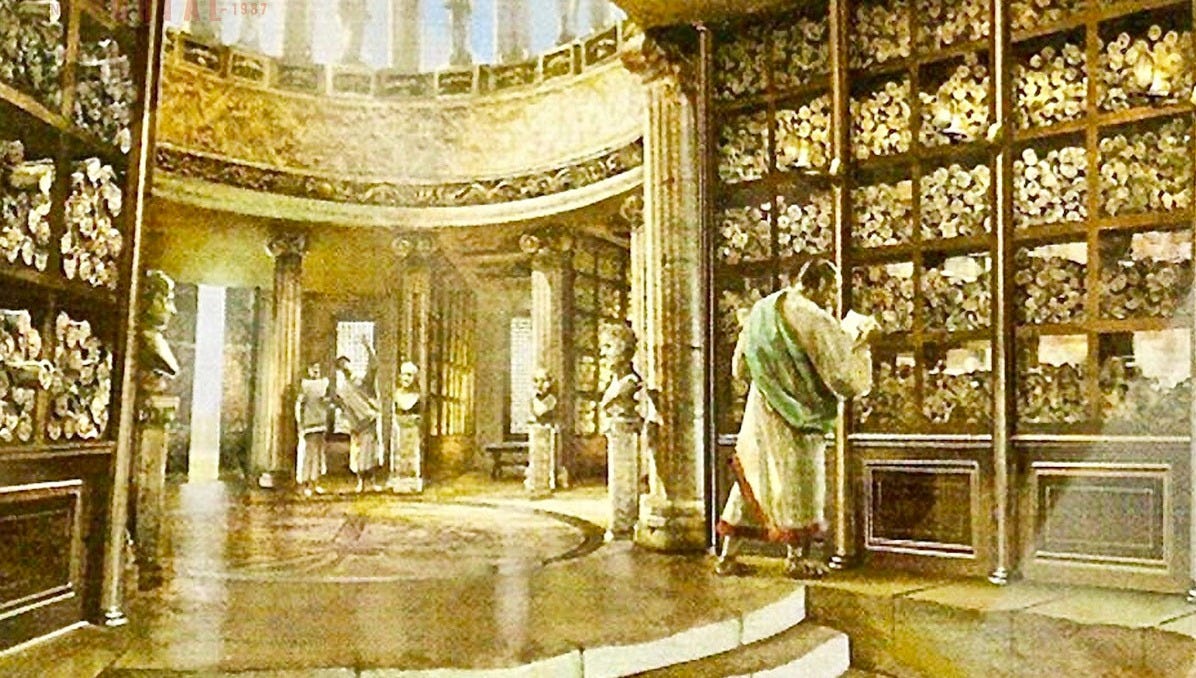
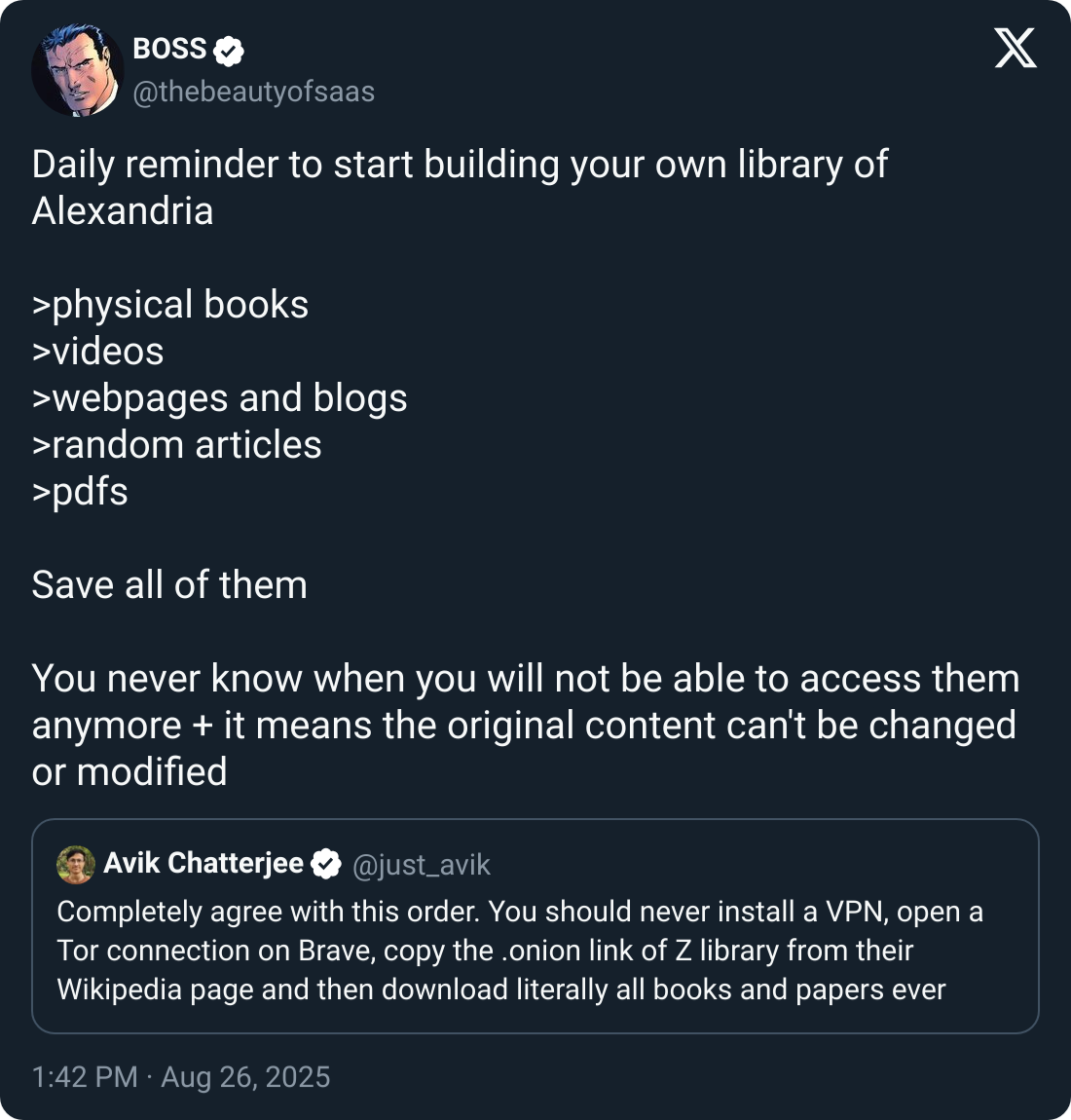
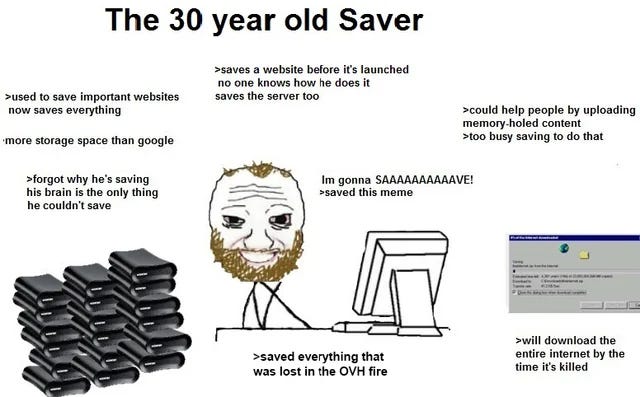
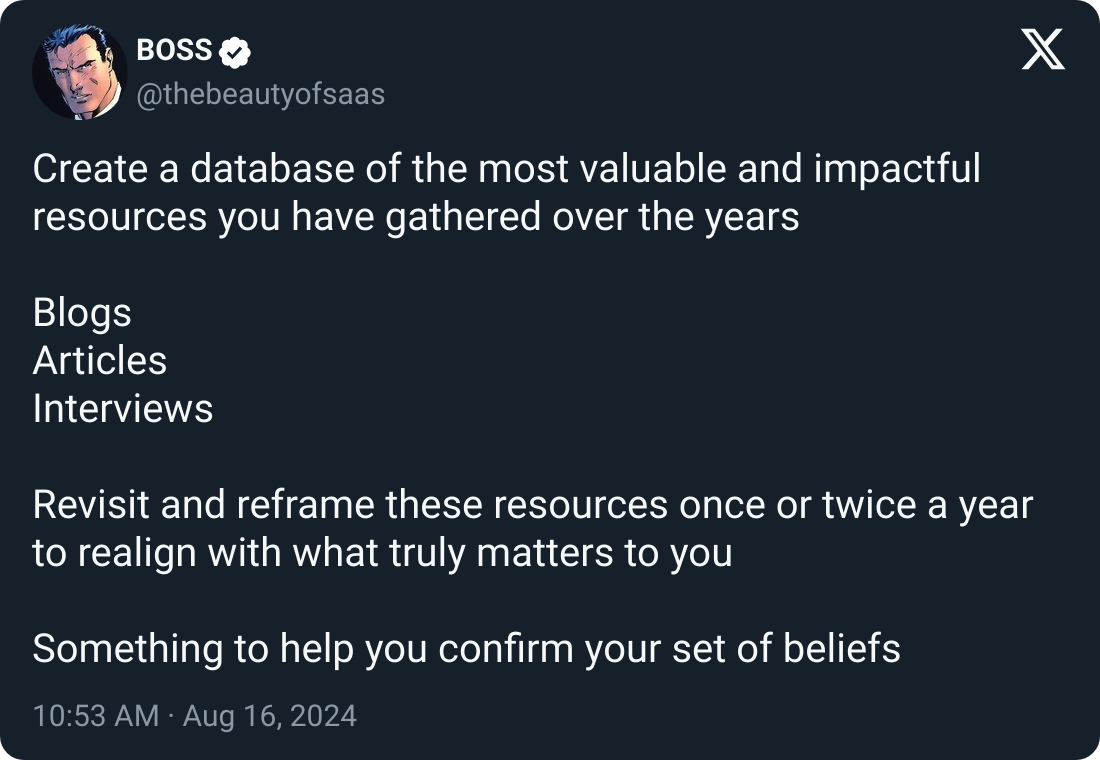

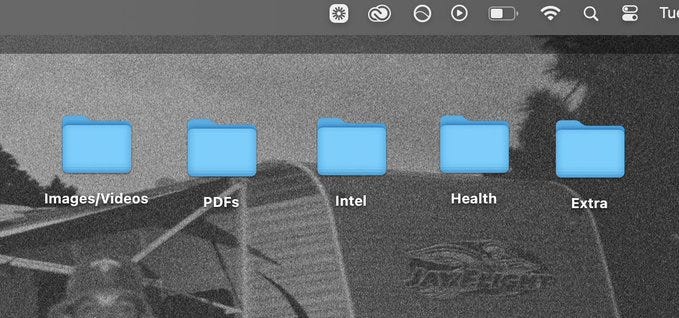
Solid advice!
I've proudly been hoarding over 3TB of obscure books since 2018, and sharing them all on Soulseek for anybody to search and download. Plus 19TB of YouTube Channels, much of it excess but also some serious gold.
And of course, steadily growing my own curated collection of high-ROI information on many topics since 2021. I can't imagine how many times I've come back to my little library to re-read a killer article from years ago, or to give myself a refresher on an old topic of interest.
I definitely fall into the Schizo tier. No regrets.
ArchiveBox is a solid recommend, and while it will take an absolute noob an afternoon to install it, it's absolutely worth doing. It will archive websites *for you*, meaning you don't need HTTrack or any other manual tools. Just copy-paste a URL and be done, or use the browser extension and Right click > Save.
About file syncing: rclone is designed for one-off transfers, or syncing in a parent-child relationship, which makes it great for creating backups (local hard drive, or the cloud). But it is NOT good for *bi-directional syncing!* You're likely to accidentally delete data if used this way - I've done it. For file syncing between devices, where you'll be reading and making changes on more than one device, please use SyncThing (blue logo). I've been in this space for a decade, and there's nothing simpler. It's also incredibly reliable and even has a mobile app.
Anybody interested in doing this at scale (more than just your own little library) should come over to /r/DataHoarder and start reading. But don't get lost in the "hobby". Lots of these people just have attachment issues. All you need to do is learn the principles and practices of why and how to download what you care about. And for God's sake, make backups!
Hit me up with any questions.
Just what I was looking for, great article brother.